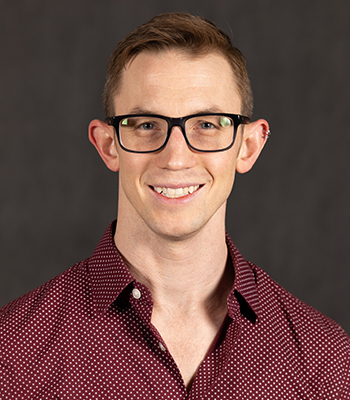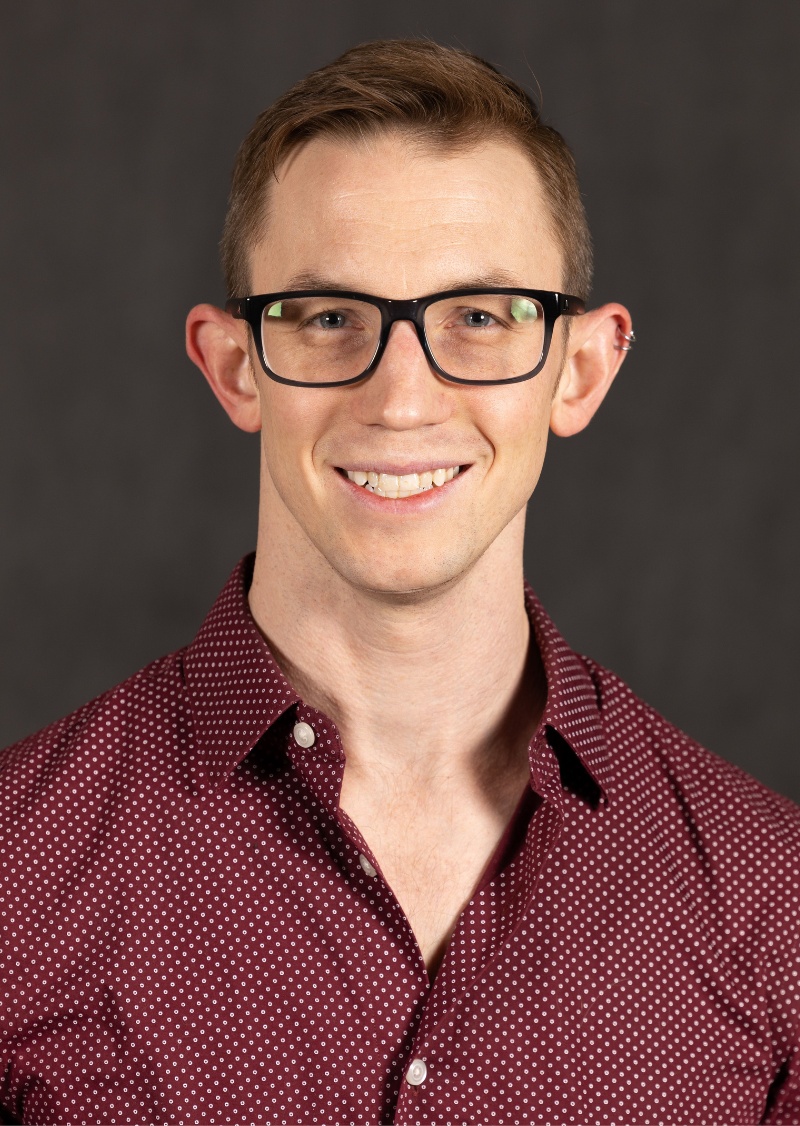Charlie Fehl (gq0554)
University information
Contact information
Cancer Biology Program
Office: 469 Chem
Chemistry
Lab: 460 Chem
https://fehl-lab.com/
• Chemical tools to track how glycans change spatiotemporally during cell metabolism and signaling
• Biochemical studies to discover and predict functional effects of protein glycosylation
• Medicinal chemistry to inhibit metabolic risk factors in tumorigenic pathways
All cells use sugar, but a consequence of unbalanced sugar usage is disease through hexosamine sugar signaling pathways including glucosamines. To precisely define the roles of hexosamine sugar-driven effects, the Fehl Group designs chemical tools sensitive for live-cell applications, for example our light-controlled photosugars and our cell compartment-specific "GlycoID" labeling strategy. We apply chemical biology tools at the interface of metabolism disease and cancer pathways to discover new roles for glucose-driven events in cells and disease. A key target area is determining the mechanisms and potential treatment strategies for cancers that have elevated risk in patients with hyperglycemia.
Charlie Fehl received a B.S. in Biochemistry from the University of Michigan in 2009 and a Ph.D. in Medicinal Chemistry from the University of Kansas in 2014. After conducting postdoctoral research at the University of Oxford on protein modification methodology development, he opened his independent research lab at Wayne State University in 2018. The Fehl Lab builds chemically-controlled tools for glycobiology studies. We also have a dedicated disease project platform that investigates how hyperglycemia can lead to diabetes and different tumor types using a combination of in vitro and in vivo models, offering a diverse set of skills to train a next generation of chemical biology innovators.
“Adipose microenvironmental reprogramming of ovarian cancer cells to an immune-hardened high sialic acid glycosylation state.” Alexandra Fox†, Garry D. Leonard† († co-first), Nicholas Adzibolosu, Sapna Sharma, Terrence Wong, Roslyn Tedja, Radhika Gogoi, Robert Morris, Gil Mor, Charlie Fehl*, Ayesha B. Alvero*. (*correspondence) Frontiers in Oncology, submitted. Online on bioRxiv at: https://doi.org/10.1101/2024.05.13.593990
“GlycoID Proximity Labeling to Identify O-GlcNAcylated Protein Interactomes in Live Cells.” Zachary M. Nelson, Oseni Kadiri, and Charlie Fehl. Current Protocols in Chemical Biology (2024), 4, doi: https://doi.org:10.1002/cpz1.1052
“Tools for investigating O-GlcNAc in signaling and other fundamental biological pathways.” Nelson, Zachary M.; Leonard, Garry D.; Fehl, Charlie. Journal of Biological Chemistry (2024) 300: pg. 105615. doi: https://doi.org/10.1016/j.jbc.2023.105615
Saheed Ayodeji, Emily A. Teslow, Lisa A. Polin, Greg Dyson, Aliccia Bollig-Fischer, and Charlie Fehl. Hyperglycemia and O-GlcNAc transferase activity drive a cancer stem cell pathway in triple-negative breast cancer. Cancer Cell International 2023;23:102.
Yimin Liu, Zachary M. Nelson, Ali Reda, and Charlie Fehl. Spatiotemporal Proximity Labeling Tools to Track GlcNAc Sugar-Modified Functional Protein Hubs during Cellular Signaling. ACS Chemical Biology 2022;17:2153.
Courtney A. Kon dor, Jaggaiah N. Gorantla, Garry D. Leonard, and Charlie Fehl. Synthesis and mammalian cell compatibility of light-released glycan precursors for controlled metabolic engineering. Bioorganic & Medicinal Chemical 2022;70:116918.
Charlie Fehl and John A. Hanover. Tools, Tactics, and Objectives to Interrogate Cellular Roles of O-GlcNAc in Disease. Nature Chemical Biology 2022;18:8-17.
Groenevelt, Jessica M.; Corey, Daniel J.; Fehl, Charlie. Chemical Synthesis and Biological Applications of O-GlcNAcylated Peptides and Proteins. ChemBioChem 2021;22:1854-70.
Josephson, Brian*; Fehl, Charlie*; Iseneggar, Patrick* [*equal contributors]; Nadal, Simon; Wright, Tom H.; Poh, Adeline W.J.; Bower, Ben J.; Giltrap, Andrew M.; Chen, Lifu; Batchelor-McAuley, Christopher; Roper, Grace; Arisa, Oluwatobi; Sap, Jeroen B.I.; Kawamura, Akane; Baldwin, Andrew; Mohammed, Shabaz; Compton, Richard G.; Gouverneur, Veronique; Davis, Benjamin. G. Mild, Light-Driven, Posttranslational Installation of Reactive Protein Side-Chains. Nature 2020;585: 530.
Yang, Min*; Fehl, Charlie* [*equal contributors]; Lees, Karen V.; Lim, Eng-Kiat; Offen, Wendy; Davies, Gideon J.; Bowles, Dianna J.; Roberts, Stephen J.; Davis, Benjamin G. Functional and informatics analysis enables glycosyltransferase activity prediction. Nature Chemical Biology 2018;14:1109.
Fehl, Charlie; Vogt, Caleb; Yadav, Rahul; Li, Kelin; Scott, Emily E.; Aubé, Jeffrey. Structure-based design of inhibitors with improved selectivity for steroidogenic cytochrome P450 17A1 over cytochrome P450 21A2. J. Med. Chem. 2018;61:4946.
Postdoc, 2018, University of Oxford - Chemical Biology
Ph.D. 2014, University of Kansas - Medicinal Chemistry
B.S. 2009, University of Michigan - Biochemistry

College of Liberal Arts and Sciences
Chem 469
Developing and utilizing highly selective chemical reactions that are able to occur in living cells to track sugar signaling motifs in disease states characterized by altered sugar metabolism
All cells use sugar, but a consequence of unbalanced sugar usage is disease through hexosamine sugar signaling pathways including glucosamines. To precisely define the roles of hexosamine sugar-driven effects, the Fehl Group designs chemical tools sensitive for live-cell applications, for example our light-controlled photosugars and our cell compartment-specific "GlycoID" labeling strategy. We apply chemical biology tools at the interface of metabolism disease and cancer pathways to discover new roles for glucose-driven events in cells and disease. A key target area is determining the mechanisms and potential treatment strategies for cancers that have elevated risk in patients with hyperglycemia.
Charlie Fehl received a B.S. in Biochemistry from the University of Michigan in 2009 and a Ph.D. in Medicinal Chemistry from the University of Kansas in 2014. After conducting postdoctoral research at the University of Oxford on protein modification methodology development, he opened his independent research lab at Wayne State University in 2018. The Fehl Lab builds chemically-controlled tools for glycobiology studies. We also have a dedicated disease project platform that investigates how hyperglycemia can lead to diabetes and different tumor types using a combination of in vitro and in vivo models, offering a diverse set of skills to train a next generation of chemical biology innovators.
Charlie Fehl received a B.S. in Biochemistry from the University of Michigan in 2009 and a Ph.D. in Medicinal Chemistry from the University of Kansas in 2014. After conducting postdoctoral research at the University of Oxford on protein modification methodology development, he opened his independent research lab at Wayne State University in 2018. The Fehl Lab builds chemically-controlled tools for glycobiology studies. We also have a dedicated disease project platform that investigates how hyperglycemia can lead to diabetes and different tumor types using a combination of in vitro and in vivo models, offering a diverse set of skills to train a next generation of chemical biology innovators.
University Research Grant (WSU, 2019-2020)
Ebbing Faculty Development Award (WSU, 2020-2021)
NIH R35 Grant (2021-2026): "Spatiotemporal tools to interrogate O-GlcNAc functions in cellular signaling"
NSF CAREER award (2023-2028): "CAREER: Illuminating O-GlcNAc-driven functions of the human proteome"
Mizutani Foundation for Glycoscience research grant (2023-2024): "Capturing real-time sugar signaling in cells with light-released O-GlcNAc probes"
Journal articles
- “GlycoID Proximity Labeling to Identify O-GlcNAcylated Protein Interactomes in Live Cells.” Zachary M. Nelson, Oseni Kadiri, and Charlie Fehl. Current Protocols in Chemical Biology (2024), 4, doi: https://doi.org:10.1002/cpz1.1052
- “Tools for investigating O-GlcNAc in signaling and other fundamental biological pathways.” Nelson, Zachary M.; Leonard, Garry D.; Fehl, Charlie. Journal of Biological Chemistry (2024) 300: pg. 105615. doi: https://doi.org/10.1016/j.jbc.2023.105615
- “Hyperglycemia and O-GlcNAc transferase activity drives cancer stem cell induction in triple-negative breast cancer.” Saheed Ayodeji, Emily A. Teslow, Lisa A. Polin, Greg Dyson, Aliccia Bollig-Fischer, and Charlie Fehl. Cancer Cell International (2023), volume 23: article 102.
- “Spatiotemporal Proximity Labeling Tools to Track GlcNAc Sugar-Modified Functional Protein Hubs during Cellular Signaling.” Yimin Liu, Zachary M. Nelson, Ali Reda, and Charlie Fehl. ACS Chemical Biology (2022) in-press. DOI: https://doi.org/10.1021/acschembio.2c00282
- Synthesis and mammalian cell compatibility of light-released glycan precursors for controlled metabolic engineering.” Courtney A. Kondor, Jaggaiah N. Gorantla, Garry D. Leonard, and Charlie Fehl. Bioorganic & Medicinal Chemical (2022) in-press. DOI: https://doi.org/10.1016/j.bmc.2022.116918
- “Tools, Tactics, and Objectives to Interrogate Cellular Roles of O-GlcNAc in Disease.” Charlie Fehl and John A. Hanover. Nature Chemical Biology (2022) 18: 8-17. DOI: https://doi.org/10.1038/s41589-021-00903-6
- “Chemical Synthesis and Biological Applications of O-GlcNAcylated Peptides and Proteins.” Groenevelt, Jessica M.; Corey, Daniel J.; Fehl, Charlie. ChemBioChem (2021) 22: 1854-1870. DOI: 10.1002/cbic.202000843
- “Mild, Light-Driven, Posttranslational Installation of Reactive Protein Side-Chains.” Josephson, Brian*; Fehl, Charlie*; Iseneggar, Patrick* [*equal contributors]; Nadal, Simon; Wright, Tom H.; Poh, Adeline W.J.; Bower, Ben J.; Giltrap, Andrew M.; Chen, Lifu; Batchelor-McAuley, Christopher; Roper, Grace; Arisa, Oluwatobi; Sap, Jeroen B.I.; Kawamura, Akane; Baldwin, Andrew; Mohammed, Shabaz; Compton, Richard G.; Gouverneur, Veronique; Davis, Benjamin. G. Nature (2020) 585: 530. DOI: 10.1038/s41586-020-2733-7
- “Functional and informatics analysis enables glycosyltransferase activity prediction.” Yang, Min*; Fehl, Charlie* [*equal contributors]; Lees, Karen V.; Lim, Eng-Kiat; Offen, Wendy; Davies, Gideon J.; Bowles, Dianna J.; Roberts, Stephen J.; Davis, Benjamin G. Nature Chemical Biology, 14, 1109. (2018). DOI: 10.1038/s41589-018-0154-9
- “Structure-based design of inhibitors with improved selectivity for steroidogenic cytochrome P450 17A1 over cytochrome P450 21A2.” Fehl, Charlie; Vogt, Caleb; Yadav, Rahul; Li, Kelin; Scott, Emily E.; Aubé, Jeffrey. J. Med. Chem. 2018, 61, 4946. DOI: 10.1021/acs.jmedchem.8b00419
- “Proteins as templates for complex synthetic metalloclusters: towards biologically programmed heterogeneous catalysis.” Fehl, Charlie; Davis, Benjamin G. Proc. Royal Soc. A: Math. Phys. Eng. Sci. 2016, 472, 20160078. DOI: 10.1098/rspa.2016.0078
- “Temperature dependence of turnover in a Sc(OTf)3-catalyzed intramolecular Schmidt reaction.” Fehl, Charlie; Hirt, Erin. E.; Li, Sze-Wan; Aubé, Jeffrey. Tetrahedron Lett. 2015, 56, 3137. DOI: 10.1016/j.tetlet.2014.12.068
- “Photocatalytic surface patterning of cellulose using diazonium salts and visible light.” Schroll, Peter; Fehl, Charlie; Dankesreiter, Stefan; König, Burkhard. Org. Biomol. Chem. 2013, 11, 6510. DOI: 10.1039/c3ob40990b
- “Overcoming product inhibition in catalysis of the intramolecular Schmidt reaction.” Motiwala, Hashim F.; Fehl, Charlie; Li, Sze-Wan; Hirt, Erin E.; Porubsky, Patrick; Aubé, Jeffrey. J. Am. Chem. Soc. 2013, 135, 9000. DOI: 10.1021/ja402848c
- “Use of a tandem Prins/Friedel-Crafts reaction in the construction of the indeno-tetrahydropyridine core of the haouamine alkaloids: formal synthesis of (-)-haouamine A.” Fenster, Erik; Fehl, Charlie; Aubé, Jeffrey. Org. Lett. 2011, 13, 2614. DOI: 10.1021/ol200725m
Book chapters
- “Outperforming Nature’s Catalysts: Designing Metalloenzymes for Chemical Synthesis.” Fehl, Charlie; Jarvis, Amanda G.; Palm-Espling, Maria; Davis, Benjamin G.; Kamer, Paul C.J. In Modern Developments in Catalysis; World Scientific Press: Singapore, 2016; 89-122
- “Hofmann, Curtius, Schmidt, Lossen and Related Reactions.” Fehl, Charlie; Liu, Ruzhang; McCleod, Michael; Motiwala, Hashim; Aubé, Jeffrey. In Comprehensive Organic Synthesis, 2nd Ed; Elsevier Limited: Amsterdam, 2014; 598-635
Patents
- 4. “Controlled Glycan Metabolic Engineering Systems and Applications Thereof (variant method).” Zachary M. Nelson and Charlie Fehl. United States Provisional Patent, filed June 30, 2023.
- 3. “Glycan Proximity Labeling Methods and Applications Thereof.” Yimin Liu, Zachary M. Nelson, and Charlie Fehl. United States Provisional Patent, filed June 30, 2023.
- 2. “Controlled Glycan Metabolic Engineering Systems and Applications Thereof.” Courtney Kondor, Jaggaiah Gorantla, Garry Leonard, and Charlie Fehl. United States Provisional Patent, filed June 30, 2023.
- 1. "Inhibitors of CYP17A1." Charlie Fehl, Emily E. Scott, Jeffrey Aubé. United States Patent 9,611,270 (2017).
CHM6270/7270: Drug Design (taught 2018, 2019, 2020, 2021)
CHM1240: Organic Chemistry 1 (taught 2019, 2020, 2021)
CHM6240/7240: Organic Spectroscopy (taught 2022 - present)
CHM6635/7635: Tools of Molecular Biology (taugh 2023 - present)

Courses taught by Charlie Fehl
Winter Term 2025 (current)
- CHM6240 - Organic Spectroscopy
- CHM6635 - Tools of Molecular Biology
- CHM7240 - Organic Spectroscopy
- CHM7635 - Tools of Molecular Biology
Winter Term 2024
- CHM6635 - Tools of Molecular Biology
- CHM7635 - Tools of Molecular Biology
- CHM8810 - Seminar in Organic Chemistry
- CHM8840 - Seminar in Biochemistry
Fall Term 2023
Winter Term 2023
- CHM6635 - Tools of Molecular Biology
- CHM7635 - Tools of Molecular Biology
- CHM8840 - Seminar in Biochemistry